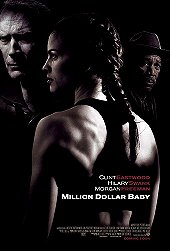Sometimes Clint Eastwood’s penchant for fast, loose, and cheap directing projects ends up working in the film’s favor, and other times it sinks the production because the sutures bleed throughout. American Sniper’s quickie nature was evident, look no further than that laughable fake baby, and The Bridges of Madison County excelled because an overly popular dime store romance became something greater in his no-fuss hands. Then there’s the films like Million Dollar Baby which not only benefit from the fast and loose approach, but the material demands it and is enriched by it.
I don’t go to Eastwood looking for radical alterations to the formulas that he so often works best within, but that doesn’t mean he can’t surprise you. Million Dollar Baby follows many of the conventions and beats of a typical boxing film, and then it shocks us with a twist that remains true to who these characters are, what they want out of their lives, and where they’re trying to reach.
Sometimes Eastwood’s work can hit squarely in sentimentality that feels unearned or garish, but not here. There’s still a sentimental streak, but it’s rough-hewn and calloused, much like the main characters. There’s a confidence on display here that’s quite rich and rewarding in how deep emotional resonances are never spelled out but lived-in and honed with a fine eye of character detail and imagery. Look at the relationship between Eastwood’s ornery bastard and Morgan Freeman’s former boxer Eddie “Scrap-Iron” Dupris. Eddie functions as the film’s observer and chorus, narrating this story of strived for redemption, failure, and penance. He exists as Eastwood’s lone employee and, seemingly, only friend as a form of apology and emotional flagellation for allowing him to partake in a fight that he never should have in the first place.
None of this is spelled out, but it’s right there on the surface if you’re ready to engage with the material and look for it. It is a type of unadorned art that doesn’t announce itself as such. Much in the same way that Eastwood’s failures and regrets as a father and brought to the fore by the presence of Maggie, the boxer of the title, and the ways in which his character taunts and teases a Catholic priest with a series of escalating questions about the absurdity of the religion. This is the closest to acts of faith he can go until the very end where the last shot is something of a quizzical blur. Has he achieved a level of penance for his sins, or is he still beating himself up for yet another one?
The film never answers these questions, but instead presents us three individual characters and looks at them with an even-keeled and clear-eyed perspective. We see them as they are, faults and failures, dreams and ambitions, all of it. It’s also an excuse to sit back and watch three superb performances. Eastwood and Freeman are veterans who can imbue pathos into this material in their sleep, but both of them are clearly engaged and enlivened by what the script tasks them with. Eastwood in particular is shockingly good, full of depth and a kind of poetry of streamlined acting. There’s not an ounce of fat in his directing or acting choices here, just a presentation of everything we need to know about the characters and their world.
But Million Dollar Baby would live or die upon the central role of Maggie, and Hilary Swank proves that the Oscar she won for Boys Don’t Cry was no fluke one-off. Swank’s become something of an uneven actress, prone to overacting like in Amelia, or poor material choices like The Reaping, but when she finds the right role she’s positively engrossing and electrifying. (Glimpse The Homesman for a more recent great turn from her.) She’s stubborn and intense here, a woman striving to better herself and find a way out of the extreme poverty and low station that she comes from, and thinks that boxing might be the best and only option. This back-story is not entirely dissimilar to Swank’s own life as a trailer-park girl who became a movie star, and that core of truth is something that other actors couldn’t bring to the role. Two Oscars may seem a bit much for her career, but she deserved them both and this performance may even be the better one between the two.
If there’s any fat to be found in Million Dollar Baby it’s in the scenes with Maggie’s white trash family. These scenes play out as grotesque comedy, almost a vaudevillian series of interludes to the dour, somber film that orbits these scenes. Margo Martindale plays her role as the mother to the tilt by emphasizing the vainglorious, ignorant nature of the character that immediately receives an act of kindness and questions the motivations and ramifications of it. These scenes are brief and over nearly as soon as they begin, and it’s quiet easy to write them off as everything else around them is so strong.
Simplicity is the key to the effectiveness of the story here. It’s not entirely a boxing film as it’s a film about a boxer. There’s training montages, series set in the boxing ring, but it’s what happens in a fateful fight that reveals its deeper ambitions and hidden moral quandaries. What happens feels authentic and believable to these characters, and that’s all that we can ask of a great story well told, really.
 Login
Login